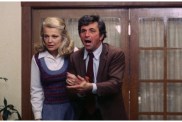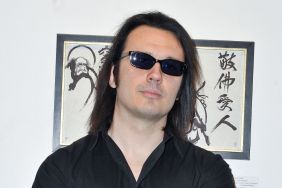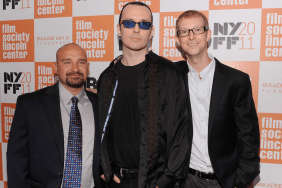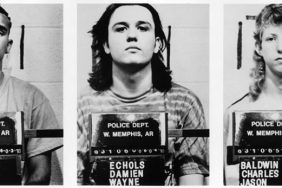There is just one more week of the Film Society of Lincoln Center’s 49th Annual New York Film Festival, and they’re saving two of the biggest events for tonight, including the World Premiere of Joe Berlinger and Bruce Sinofsky’s documentary Paradise Lost 3: Purgatory (Not to be confused with the upcoming Alex Proyas epic for Legendary Pictures), which will have the subject matter of the movie and its two predecessors–Jason Baldwin, Damien Echols and Jessie Misskelley, known as the West Memphis Three–in attendance.
In 1993, HBO Documentaries commissioned filmmakers Joe Berlinger and Bruce Sinofsky to travel down to Arkansas to document the court trial against the three young men, then teens, who were accused of killing three 8-year-old boys in a Satanic ritual. Many felt they were being unfairly tried, especially when Echols was convicted to death by lethal injection and the other two were given multiple life sentences. The results was Paradise Lost: The Child Murders at Robin Hood Hills, a movie that got many people energized and interested in helping to free the West Memphis Three, including big-name celebrities like Eddie Vedder, Johnny Depp and the Dixie Chicks, as well as leading to the formation of WM3 Freedom Fund, a trust dedicated to helping the three as well as fund the research needed to find evidence to free them.
In 2007, new evidence had been found that could prove the trio couldn’t have committed the murders, and the Supreme Court granted a reopening of the case to examine that evidence. What no one could have expected was in August, when the three accused teens, now in their early ’30s, were granted their freedom based on them giving pleas of “guilty” under the Alford Plea rule. The idea was that they could still proclaim their innocence, but that the Arizona court system would be able to save themselves from the embarrassment of any of the new information that surfaced since the trial including proof of juror misconduct. Unfortunately, the deal also means the trio can’t file a civil suit against the state for their wrongful imprisonment. Berlinger and Sinofsky returned to Arkansas to cover their release and the press conference in order to add a much-needed epilogue for the third film. The fact that the filmmakers’ work has inspired so many people to become involved in their fight for freedom, which finally has paid off, is a grand testament to the power of documentary filmmaking.
Earlier today, ComingSoon.net was invited to see the movie, which will air on HBO in January 2012, as well as take part in a Q&A with Berlinger (far left), Sinofsky (far right) and the West Memphis Three, an unprecedented event for many in attendance, including many of the defense lawyers and members of WM3.org involved with fighting for the West Memphis Three all these years, few of whom ever thought they’d see the day when they’d be free, let alone in the same room to answer questions.
After introductions by HBO’s director of documentaries Sheila Nevins, who originally read about the trial in the New York Times and commissioned the doc, the Film Society’s Richard Peña and the filmmakers, we watched the roughly two-hour film which included the newly-added epilogue. One certainly doesn’t need to have seen the earlier films to be quickly caught up to speed on the plight of the three accused men, because the key points from the earlier films are recapped, but more importantly, the film features brand new interviews and testimonial footage from the three men and some of the key players in the case including the chief investigator and Terry Hobbs, the stepfather of one of the boys who many have accused of being the real murderer. It also includes footage from the press conference where new evidence was introduced and the resulting Supreme Court hearing.
Except for a press conference in Arkansas following their release, the three wrongly-accused convicts haven’t been in the same room for any given amount of time in the past 18 years, so it was extremely brave of them to put themselves up for scrutiny by the press in attendance who had a lot of questions about their life over the past two months following 18 years of imprisonment.
It was a bit too much for Misskelley (2nd from right), who decided to leave the session after a few questions when someone asked about some of the individuals who had surfaced as potential perpetrators of the crime since their conviction. None of them feel they’ll ever be properly exonerated of the murders unless the prosecutors bother to reopen the case and find the “smoking gun” that can point to the true killer or killers, but Berlinger stressed they went out of their way to not point fingers at anyone, including Hobbs, with their third film. Baldwin originally didn’t want to take the deal but thought of his childhood friend who was facing the death penalty and it was made in the best interest of not having the case (and the trio’s imprisonment) stretch on for even more time.
“It’s kind of a raw deal for innocent people to have to say they’re guilty,” Berlinger said about the court’s decision. “In our estimation it has to do with the state trying to save face, trying to prevent themselves for being sued for wrongful conviction, because they walk out of prison as convicted killers, which is a tragedy, which is why we feel this ending isn’t the happy ending we would have liked it to be. Of course, we’re thrilled they’re out of prison, but it’s a bittersweet conclusion to this affair, which we hope is not the conclusion because many people are still committed to pushing for full exoneration. It means they have a bit of a Sword of Damocles hanging over their heads.”
Understandably, neither Echols (center) nor Baldwin (second from left) have returned to West Memphis since their release, instead, using their first seven weeks of freedom to live their lives and adapt to how the world has changed since their incarceration, noting there weren’t cell phones or the internet around before they were convicted. Still wearing black–something that may have contributed to bias against him in the first place–Echols had just returned from a trip to Disneyland, and he’s been keeping track of all his “firsts” since being released, though he admitted to not being a fan of the recent DreamWorks remake of Fright Night, the first movie he saw since being released, which he dubbed “horrendous.” He’s also been acclimating himself to being around people again, having been in solitary confinement for the last ten years. They were mostly in good spirits though with Baldwin sharing a few personal stories from his time in jail, including one about his only interaction with Echols during that time, as well as a recent experience seeing one of the bands who had been involved in their fight for freedom.
When asked about their feelings on the people who put them away for 18 years despite knowing they probably didn’t commit the murders, Baldwin responded, “That’s the scariest question I’ve asked myself for years. Do they truly not know or do they know and not care? Are their decisions made on mistakes on judgment, mistakes on character or is it something more sinister and appalling, like they don’t know who done it, they don’t care who done it and they have someone who can’t defend themselves? You don’t want to think people are in a position of power and authority that they abuse it in that fashion.”
“I think they know exactly who did it and they just didn’t care,” Echols added cynically, which would be expected considering his experiences with the justice system and how many involved in their case, including judges and prosecutors, have been more concerned about their political careers and getting votes down the road than the actual guilt or innocence of those they convicted. Baldwin was more optimistic that despite their improper conviction and imprisonment, people are still generally good, though Echols felt it was too big a question to answer right away.
When asked about the recent Troy Davis execution, Echols said that he had written a letter to the governor asking him not to execute him. “It happens all the time. You have people in Arkansas on Death Row that there’s no evidence linking them to the crimes they’re there for whatsoever. Even people that do the crime, society has this image in their mind that people on Death Row are these insane genius Hannibal Lecter types. They’re not. They are mentally retarded, they’re schizophrenic, they’re brain-damaged, it’s people who are screwed up, so even if guilty, it’s simply horrifying when they execute them, let alone the innocent.”
Berlinger called making a third movie based on 18 years of footage they had shot “a tremendous learning experience about the nature of truth and how truth evolves and changes over time.” For instance, information they didn’t think was relevant in 1999 when they made the second movie ended up being far more relevant while making the third.
When asked, Nevins hasn’t ruled out the possibility of someday doing a fourth “Paradise Lost” movie if there’s a story to be told, and listening to the men talk and seeing Jason’s “Shakespearean loyalty” to Damien certainly inspires one to think there’s a story there about the aftermath of everything that’s happened to them which could be made in five or ten years time to cover the trio’s freedom and any possible developments in getting them properly exonerated. She said they’d only do it if they were willing, to which Echols stated, “I don’t see why not.”
Paradise Lost 3: Purgatory will premiere on HBO in January 2012, but you can guarantee that the movie will screen theatrically at least in New York and L.A. by year’s end to make it eligible for the 2012 Academy Awards.










